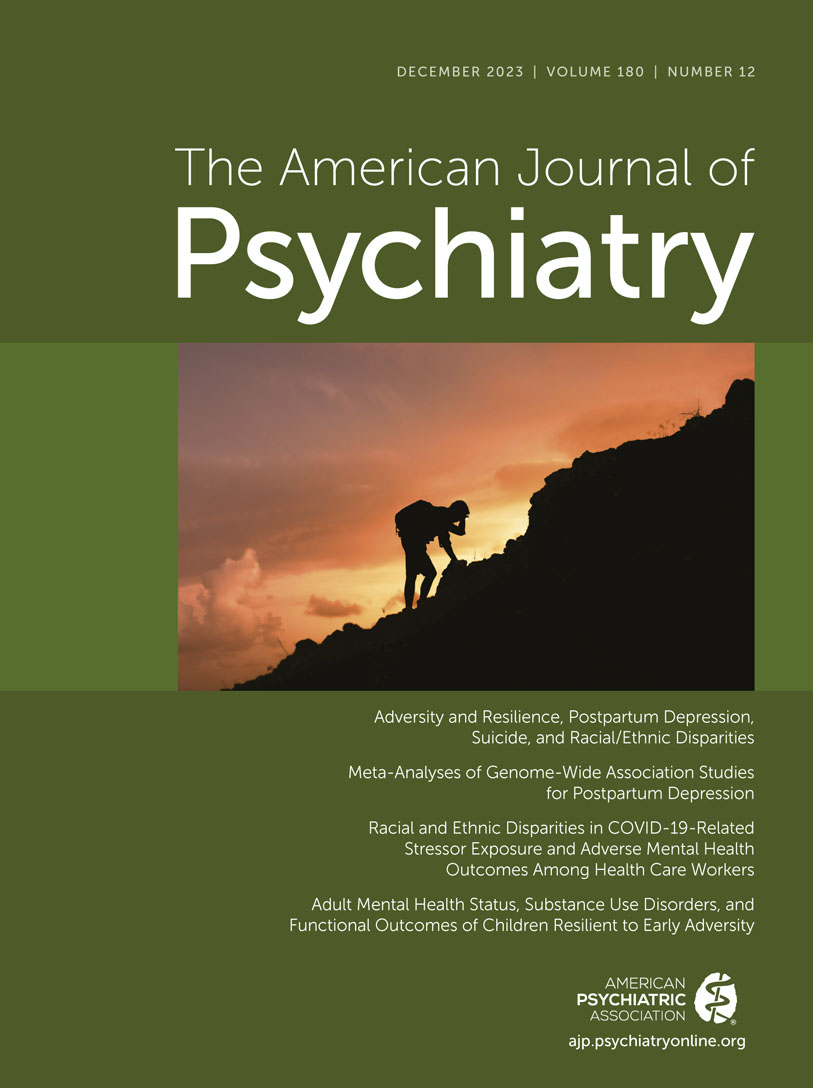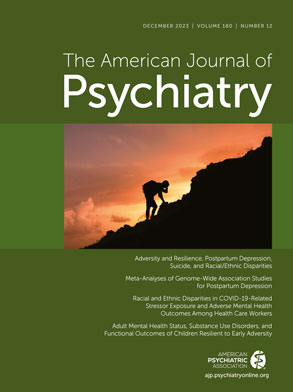“Sweet are the uses of adversity,
Which, like the toad, ugly and venomous,
Wears yet a precious jewel in his head…”
—Shakespeare,
As You Like It (
1)
The results reported in this issue by Copeland and colleagues (
2) illustrate that resilience in the face of childhood adversity (i.e., lack of psychiatric symptoms) does not translate into flourishing later in adulthood. Although the adult outcomes in the domains of criminality, social functioning, and substance abuse for resilient children were comparable to the outcomes of their peers who had not been exposed to childhood adversity, formerly resilient children were still at greater risk of developing emotional disorders and tended to experience worse physical health, financial, and educational outcomes.
We are impressed by the state-of-the-art methods used in this study. It is unusual to be able to assess functioning so close to the experience of adversity, and rarer still to be afforded the opportunity to follow the same sample long into the future. These data provide convincing evidence that apparent resilience does not translate into sustained psychological and physical well-being. This study suggests that the impact of adversity on psychosocial functioning of the initially resilient children may only be discernible over a longer time span. These findings build on earlier evidence that psychological resilience to adversity in childhood is associated with increased physiological stress later in life (
3,
4) to show that the picture is considerably worse than originally depicted.
The fact that these effects emerge gradually over longer periods of developmental time calls for further investigation into other instances where individual differences in initial resilience to trauma and adversity have been observed (
5). In addition to methodological issues with measuring such initial resilience to adversity (
6), it also appears increasingly plausible that short-term resilience may simply be obscuring negative effects for some people, akin to the developmental “sleeper effects” proposed by Kagan and Moss (
7).
These findings calling into question the idea of growth through trauma also dovetail with recent findings in personality psychology. Prospective longitudinal research has found null effects or decreases in life satisfaction, generativity, meaning-making, gratitude, compassion, spirituality (
8), self-control (
9), character strengths (
10,
11), openness to experience (
12), and wisdom (
13) following adversity.
What is most striking about the cumulative drumbeat of findings contradicting empirical and theoretical arguments about resiliency in the face of trauma is the widespread belief that rising above trauma is a source of positive growth. Lay people, pundits, and social scientists alike have all articulated the cultural narrative that psychological resilience reflects one form of mature functioning that can only be achieved through adversity. Commentators tout the benefits of posttraumatic growth (
14), warn against the dangers of coddling children (
15), and champion the importance of adversity for the development of character (
16).
If the benefits of adversity are so hard to empirically verify, why do these cultural narratives persist? One reason may be a distinct lack of clarity about what constitutes growth-inducing, resilience-sparking experiences. Many advocates for the positive effects of adversity rely on overly inclusive and vague definitions (for example, posttraumatic growth theorists Tedeschi and Calhoun include the following experiences in their definition: “we use the words trauma, crisis, highly stressful events, and other similar terms interchangeably, as roughly synonymous expressions” [
14, p. 1]). Going forward, we suggest that researchers and pundits alike further clarify just what they mean by adversity and which types of adversity might be the inspiration for their arguments. Without major advances in conceptual clarity, it will be impossible to identify valid measures, create falsifiable predictions, and accumulate replicable knowledge—all bedrocks of robust science.
More rigorous and precise conceptualization and measurement of life experiences is essential because it is still plausible that certain types of stressful and challenging experiences play a key role in the development of resilience. What we have in mind are experiences that are clearly not traumatic but still may be construed as stressful or challenging. The adverse experiences that were the focus of the present study—low socioeconomic status, unstable family structure, family dysfunction, maltreatment, and peer victimization—are forms of interpersonal and social-structural harm that young people cannot self-select into or consent to. However, over the course of development, people can consent to and self-select into a variety of challenging experiences that have been interpreted by personality scholars as leading to growth and maturation. For example, studying for a difficult college entrance examination such as the German
Abitur (
17), putting effort into challenging homework (
18), or participating in a personality change intervention (
19) have all been shown to change personality in the direction of greater resiliency, but these experiences may also be difficult and stressful to a nontrivial degree because they challenge people to stretch beyond their comfort levels (
20).
Such experiences can be conceptualized as falling within the “sweet spot” of stress (
21), between experiences that are neutral or pleasurable and traumatizing experiences that cause harm to our mental and physical health. This general notion that experiences which fall between debilitating trauma and being coddled constitute a sweet spot for sparking maturation and resilience has been variously proposed in theories of lifespan personality development (
22), toughness (
23), resilience to nontraumatic everyday stressors (
24), stress inoculation (
25), and stress immunization (
26).
The distinction between trauma and the sweet spot may be the key for reconciling the growing empirical evidence that trauma does not lead to resilience and the persistent belief that some difficulty is necessary to develop resilience and maturity. The Copeland et al. study provides the best evidence to date that in the context of trauma, resilience is seldom achieved, and when it is apparently achieved, the lack of distress is misleading. Those who argue for the benefits of trauma and adversity might instead find replicable effects in the developmental gains that are born out of the relatively modest self-imposed suffering that comes with setting and meeting challenging goals.
When combined with the accumulating evidence that few, if any, people grow after trauma, Copeland and colleagues’ findings point to a prudent distinction to be made by researchers and lay audiences alike. Trauma is best to be avoided. When people suffer from trauma, we should do all we can to help. Rather than focus on growth or resilience from trauma, we should refine our understanding of the diverse circumstances that lead to resilience and maturity and test this broader array of experiences. Is it mild distress that best arms people with the ability to handle future challenges? Is it self-imposed suffering (e.g., training for a marathon or choosing to take a difficult math class) that leads to growth and resilience? Testing the developmental effect of these experiences may reveal outcomes that differ from prior adversity research and may better reflect lay understandings of resilience and maturation.

